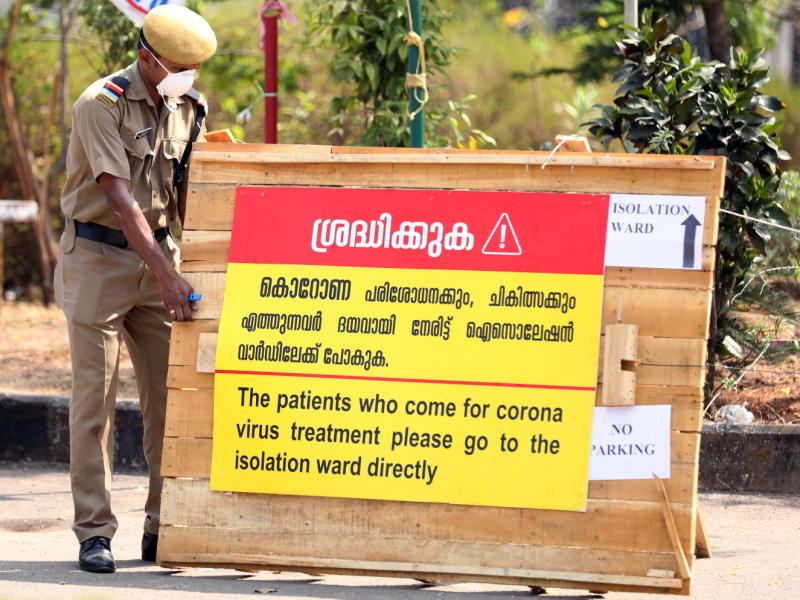Coronavirus: India's Kerala state spots cases early after experience with 2018 Nipah outbreak
Sign up now: Get insights on Asia's fast-moving developments

A police officer wears a protective face mask as he sets up a coronavirus alert board outside a hospital in Kochi, India, on Feb 5, 2020.
PHOTO: EPA-EFE
BANGALORE - The first three confirmed cases of coronavirus in India have all turned up in Kerala, which experts say is an indication of the state's unique proactive surveillance of at-risk people.
Most of the over 2,200 people who are under quarantine there were identified at airports and district hospitals on their return from China.
The preparedness is a lesson from the south Indian state's experience with the Nipah virus outbreak in 2018. It lost 16 of 18 people diagnosed with the deadly virus, including Ms Lini Puthussery, a 28-year-old nurse who treated the first patient to exhibit symptoms.
On Ms Puthussery's death anniversary last year, Health Minister K. K. Shailaja wrote on her Facebook profile: "While paying respect to the memory of Lini, let us pledge together to jointly fight against all the communicable diseases."
Unlike most states where there are more doctors in urban area, Kerala's (and Tamil Nadu's) rural public health system has no vacancies.
Decades of investment in public healthcare infrastructure and decentralised governance by all political regimes have created a wide network of primary health centres at the village level. Kerala built its capacity to handle epidemics, however, after a significant jolt from the Nipah virus.
"During the Nipah outbreak, even though we diagnosed what the virus was with the second case, we didn't have any experience in handling cases with such high mortality that are also so highly infectious," said Dr Anoop Kumar, the chief of Critical Care Medicine at Kozhikode's Baby Memorial Hospital.
The 49-year-old doctor was the first to diagnose Nipah after he suspected "an exotic virus" in a critically-ill patient who turned up at his hospital with encephalitis-like symptoms but an unusually racing pulse and high blood pressure.
After some initial struggle, the state put together an integrated surveillance, diagnosis and prevention mechanism. Even though cases were reported from only two districts of Kozhikode and Malappuram, where fruit bats - a possible source of the virus - were breeding, the surveillance net was rapidly scaled up to neighbouring districts as well.
The government issued advisories, updated it on the Health Ministry website, and shared it with all states. The World Health Organisation (WHO) commended Kerala's "strong health system" and emergency preparedness that enabled it to contain the spread.
Mr Rajeev Sadanandan, the former health secretary who helmed Kerala's response to Nipah virus, said: "Frankly, there were two embarrassing things in the Nipah experience. One, that we missed the index case."
The first person who turned up with the symptoms died before his sample could be collected.
"Two, a lot of infections happened in the hospital setting. Both are not signs of a good health system," said Mr Sadanandan, who now chairs health systems research at the Indian Council of Medical Research.
To avoid repeating its mistakes, Kerala created structures like isolation centres and "cuff corners" to prevent hospital-acquired infections. For faster detection, the state also developed case definitions of emerging pathogens and established response protocols.
"A suspect's samples will be taken and verified against the predetermined set of pathogens. When it is not one of them, we assume it is 'Pathogen X', which is how WHO defines an unknown virus. If the samples test positive for a known virus, we trace everyone the patient has been in contact with, isolate them, observe and follow up for the 15 days incubation period," explained Mr Sadanandan.
As news of the coronavirus outbreak in China emerged in January, Kerala became "extra vigilant", the Health Minister said.
Within a week, the state set up a health desk in all four of its airports to screen international passengers, who are given a health card to fill out with details of their travel and health.
People with fever, cough or sore throat - symptoms of the coronavirus infection - are taken for examination by medical practitioners, and quarantined for observation.
"Nipah came out of the blue, while 2019-novel coronavirus was very much expected as several Kerala students from Wuhan, China came back to Kerala in early January 2020 for the Chinese New Year vacation and then due to the outbreak. So, preparedness was better," said Mr G. Arunkumar, director of the Manipal Institute of Virology in Mahe, who had helped identify the Nipah virus early.
As of Feb 3, 2,239 people are isolated and under surveillance in Kerala. Of these, three people, from different regions of the state but all with a history of travel to Wuhan, tested positive for the virus.
On Feb 4, the Kerala government declared the disease caused by the coronavirus as a "state calamity", a protocol that allows for a marshalling of state resources.
Kerala's public awareness campaign now encourages those who return from China and show even a mild fever to go to the nearest health centre.
Mr Sadanandan said that health secretaries in most other Indian states were worried that without proactive surveillance, the coronavirus might spread undetected.
"What you need is political will, an adequate number of personnel in the public health system, these people having adequate capacity and training, and also pride in their job - that an epidemic won't happen on my watch," he said.


